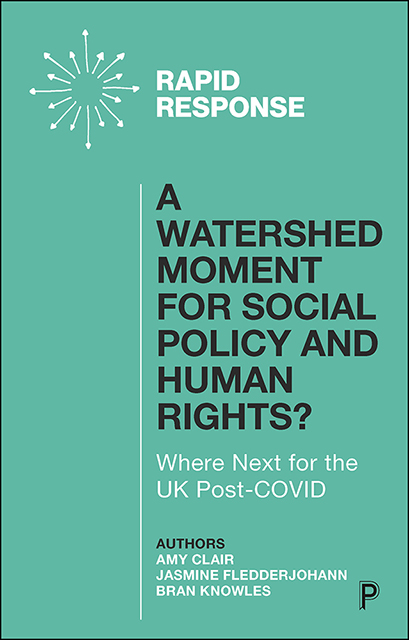2 - The right to medical care
Published online by Cambridge University Press: 21 April 2023
Summary
The COVID-19 pandemic is, first and foremost, a public health emergency. However, while the pandemic's scale and the associated pace of illness and death merit labelling it an emergency, our use of this term does not imply that a largescale infectious outbreak of this nature was unforeseeable nor impossible to plan for. Although political and popular rhetoric often frames emergencies (or disasters, crises, etc.) as unpredictable disruptions to otherwise well-functioning social systems and institutions, SRT challenges this framing (Illner, 2020). Instead, emergencies can best be understood as moments ‘in which natural crises, do not create, but rather expose ongoing social crises’ (Illner, 2020, p. 3). These social crises are the consequence of longstanding neglect and active erosion of structural support for social reproduction, involving processes of marginalisation and social divestment that leave systematically devalued members of the population disproportionately susceptible to natural crises. COVID-19 is no exception: Emerging evidence suggests that several governments (including the US and the UK) simulated flulike pandemics and identified catastrophic gaps in the public health response well before the first cases of COVID-19 were identified, but no action was taken to prepare, and in fact in some cases health systems were subjected to further cuts, leaving systematically devalued people at greatest risk of illness and death (Friedman, 2020; PHE, 2017; Scally et al, 2020).
Neoliberal ideology favours private provision of health care and views spare capacity in the system as waste, leaving health systems exposed at times of increased demand. As a result, we are now witnessing severe distortion in the healthcare system of many countries as patients with serious conditions have their treatment slowed by the impacts of the pandemic. Problematic at any time, by causing a simultaneous health and employment crisis, the trajectory of COVID-19 in the US has highlighted the flaws of linking health insurance to employment, while the private nature of US healthcare has meant reduced income for health services as capacity for more profitable medical procedures have been limited. Nor has the UK been immune to the damage caused by simultaneous health and employment crises; systematic privatisation of the NHS and neglect to compensate people adequately for lost income in cases where isolation is required has resulted in a catastrophic failure to limit the spread of disease – a situation compounded by increased difficulties accessing food, poor housing conditions, and state investment in ineffective and unreliable methods for tracing the spread of COVID-19.
- Type
- Chapter
- Information
- A Watershed Moment for Social Policy and Human Rights?Where Next for the UK Post-COVID, pp. 15 - 34Publisher: Bristol University PressFirst published in: 2023



